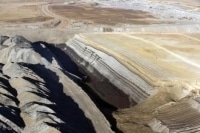On Tuesday, the Government Accountability Office released a much-anticipated report about the Bureau of Land Management’s coal leasing program, revealing it has stiffed taxpayers over $200 million.
The GAO blames a lack of competition in the bidding process, reliance on outdated and incomplete methods to determine “fair market value” of the coal reserves, a disregard of coal exports and their impact on fair valuation, and a blatant lack of transparency in the leasing program.
Senator Edward Markey, who had requested the GAO investigation in 2012 while he still served in the House, responded immediately to the report’s findings. The GAO didn’t address specifics on how much public revenue might have been lost by mismanaged leases and auctions.
Senator Markey explained that based on an examination of the report and other coal leasing documents that were not made public, his staff figured that the the BLM could have earned at least $200 million more for the American public if managed properly.
Unfortunately, the coal leasing documents investigated by Markey’s staff aren’t available to the public, which the GAO claims is because of the inclusion of private business information. According to Ned Griffith of the GAO, the information in the report was labeled “sensitive but unclassified” by the Interior Department.
In other words, even though one of the major findings of the GAO report was a troubling lack of transparency, the office itself is shielding from public view these detailed documents about coal leases on public lands.
In a statement introducing the report to his colleagues and constituents, Sen. Markey expressed frustration with the lack of transparency:
“As part of its investigation, the GAO released two reports to me, one that is public and one that is not able to be made public. GAO kept one of these reports non-public because the Interior Department believes that the proprietary information contained in the non-public report could harm the integrity of future lease sales. I believe that increased transparency with these coal lease sales would increase the integrity of the process, not lessen it.
“Based on my staff’s examination of the materials, I believe that using appropriate market calculations and assumptions in some recent coal lease sales could potentially have yielded $200 million more for the American people, and possibly hundreds of millions of dollars more.
“It would be very helpful for the American people to be able to review this information. But even if that is not possible because of concerns about proprietary information, Senators should be able to review this information and debate it in order to ensure that taxpayers are protected.”
Perhaps confused, National Mining Association vice president Luke Popovich called on Markey to be more transparent with his calculations. “Where’s the data?” Popovich said. “If we’re seeking greater transparency from the (government), we ought to be seeking greater transparency from everyone making claims.”
Sen. Markey publicly called upon the GAO to release all of the data and information in that second, non-public report.
The GAO report is just the latest in a lengthening line of troubles for the BLM coal leasing program. In July, the Department of Interior’s own Inspector General condemned the program, releasing a highly critical report that documented a number of flaws in the BLM’s Coal Management Program. The Inspector General report said that the BLM‘s programs “put the government at risk of not receiving the full value for coal leases.”
Then, later in the Summer, the BLM twice hosted auctions that failed to yield a single sale.
Responding to the GAO report, an Interior Department spokesperson said in a statement that the BLM has “has already begun implementing a number of reforms designed to…ensure that the program is obtaining a fair return to the public for Federal coal resources.”
It remains to be seen if Senator Markey will succeed in shining sunlight on the “sensitive but unclassified” documents, allowing other legislatures and the American public to see what is happening to our publicly-owned coal reserves.
Subscribe to our newsletter
Stay up to date with DeSmog news and alerts







